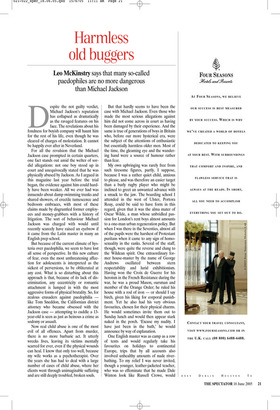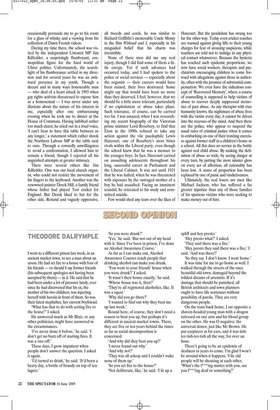Harmless old buggers
Leo McKinstry says that many so-called paedophiles are no more dangerous than Michael Jackson Despite the not guilty verdict, Michael Jackson’s reputation has collapsed as dramatically as the ravaged features on his face. The revelations about his fondness for boyish company will haunt him for the rest of his life, even though he was cleared of charges of molestation. It cannot be happily ever after in Neverland.
For all the revulsion that the Michael Jackson case prompted in certain quarters, one fact stands out amid the welter of sordid allegations: not one boy stood up in court and unequivocally stated that he was physically abused by Jackson. As I argued in this magazine last year before the trial began, the evidence against him could hardly have been weaker. All we ever had was innuendo about damp swimming trunks and shared showers, of erectile tumescence and bedroom embraces, with most of these claims made by disgruntled former employees and money-grabbers with a history of litigation. The sort of behaviour Michael Jackson was charged with would until recently scarcely have raised an eyebrow if it came from the Latin master in many an English prep school.
But because of the current climate of hysteria over paedophilia, we seem to have lost all sense of perspective. In this new culture of fear, even the most unthreatening affection for adolescents is interpreted as the sickest of perversions, to be obliterated at any cost. What is so disturbing about this approach is that, because of its lack of discrimination, any eccentricity or romantic attachment is lumped in with the most aggressive forms of physical brutality. So, for zealous crusaders against paedophilia like Tom Sneddon, the Californian district attorney who became obsessed with the Jackson case — attempting to cuddle a 13year-old is seen as just as heinous a crime as sodomy or assault.
Now real child abuse is one of the most evil of all offences. Apart from murder, there is no more barbaric act. It utterly wrecks lives, leaving its victims mentally scarred for ever, even if the physical wounds can heal. I know that only too well, because my wife works as a psychotherapist. Over the years she has had to deal with a large number of cases of child abuse, where her clients went through unimaginable suffering and are still deeply troubled, broken souls. But that hardly seems to have been the case with Michael Jackson. Even those who made the most serious allegations against him did not come across in court as having been damaged by their experience. And the same is true of generations of boys in Britain who, before our more hysterical era, were the subject of the attentions of enthusiastic but essentially harmless older men. Most of the time, the gleaming eye and the wandering hand were a source of humour rather than fear.
My own upbringing was rarely free from such tiresome figures, partly, I suppose, because I was a rather quiet child, anxious to please, and was therefore an easier target than a burly rugby player who might be inclined to greet an unwanted advance with a smack to the jaw. The boarding school I attended in the west of Ulster, Portora Roay, could be said to have form in this regard, given that it was the alma mater of Oscar Wilde, a man whose unbridled passion for London’s rent boys almost amounts to a one-man urban regeneration policy. But when I was there in the Seventies, almost all of the pupils were the harshest of Protestant puritans when it came to any sign of homosexuality in the ranks. Several of the staff, though, were quite the reverse and clung to the Wildean spirit. One extraordinary former house-master by the name of George Andrews oscillated between stern respectability and lurid exhibitionism. Having won the Croix de Guerre for his heroism in the French Resistance during the war, he was a proud Mason, oarsman and member of the Orange Order; he ruled his house with a rod of iron — or should I say birch, given his liking for corporal punishment. Yet he also had his very obvious favourites, chosen for their physical charms. He would sometimes invite them out to Sunday lunch and would then appear stark naked in the porch. ‘Excuse my nudity. I have just been in the bath,’ he would announce by way of explanation.
One English master was as camp as a row of tents and would regularly take his favourites on holidays to continental Europe, trips that by all accounts also involved unhealthy amounts of nude riverbathing. To my relief I was never invited, though a younger, leather-jacketed teacher, who was so effeminate that he made Dale Winton look like Russell Crowe, would occasionally persuade me to go to his room for a glass of whisky and a viewing from his collection of Dawn French videos.
During my time there, the school was visited by the independent Unionist MP Jim Kilfedder, a surprisingly flamboyant, cosmopolitan figure for the hard world of Ulster politics. Unfortunately, the searchlight of his flamboyance settled in my direction and for several years he was an awkward presence in my youth. Though a decent and in many ways honourable man — who died of a heart attack in 1993 when gay rights activists threatened to expose him as a homosexual — I was never under any illusions about the nature of his interest in me, especially after one embarrassing evening when he took me to dinner at the House of Commons. Having imbibed rather too much claret, he cried out in a loud voice, ‘I can’t bear to have this table between us any longer,’ a statement which rather shook the Northern Labour MP at the table next to ours. Through a cowardly unwillingness to avoid a confrontation, I allowed him to remain a friend, though I rejected all his anguished attempts at greater intimacy.
There were several others like Jim Kilfedder. One was our local church organist, who could not restrict the movement of his fingers to the keyboard. Another was the renowned painter Derek Hill, a family friend whose father had played Test cricket for England. But Derek liked to bat for the other side. Rotund and vaguely oppressive, all tweeds and cords, he was similar to Richard Griffiths’s memorable Uncle Monty in the film Withnail and I, especially in his misguided belief that his charm was irresistible.
None of these men did me any real injury, though I did find some of them a little creepy. Yet if such advances had occurred today, and I had spoken to the police or social services — especially about the organist — their careers would have been ruined, their lives destroyed. Some might say that would have been no more than they deserved. I feel, however, that we should be a little more tolerant, particularly if no exploitation or abuse takes place. Such tolerance, of course, can be carried too far. I was amazed, when I was researching my recent biography of the Victorian prime minister Lord Rosebery, to find that Eton in the 1890s refused to take any action against the vile paedophile Lewis Harcourt, one of Rosebery’s most bitter rivals within the Liberal party, even though the school knew that he was a menace to the younger boys. In fact, Harcourt carried on assaulting adolescents throughout his long, successful career in Parliament and the Liberal Cabinet. It was not until 1921 that he was halted, when he was threatened with exposure by the outraged mother of a boy he had assaulted. Facing an imminent scandal, he retreated to his study and committed suicide.
Few would shed any tears over the likes of Harcourt. But the pendulum has swung too far the other way. Today even cricket coaches are warned against giving lifts to their young charges for fear of arousing suspicions, while teachers are told not to indulge in any physical contact whatsoever. Because the hysteria has reached such epidemic proportions, we now have social workers, therapists and psychiatrists encouraging children to come forward with allegations against those in authority, often with the promise of substantial compensation. We even have the ridiculous concept of ‘Recovered Memory’, where a course of counselling is supposed to help victims of abuse to recover deeply suppressed memories of past abuse. As any therapist with true humanity knows, the nightmare of abuse lives with the victim every day; it cannot be driven into the recesses of the mind. And then there are the police, who appear to suspend the usual rules of criminal justice when it comes to embarking on one of their trawling exercises against former staff in a children’s home or a school. All this does no service in the battle against real child abuse. By making the definition of abuse so wide, by seeing danger at every turn, by putting the most sinister gloss on every act of affection, all rationality has been lost. A sense of proportion has been replaced by one of panic and vindictiveness.
Ultimately, the real losers are men like Michael Jackson, who has suffered a far greater injustice than any of those families of his spurious victims who were seeking to make money out of him.

















































 Previous page
Previous page